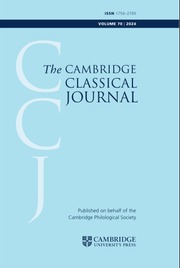Article contents
ATHEISTIC AESTHETICS: THE SISYPHUS FRAGMENT, POETICS AND THE CREATIVITY OF DRAMA
Published online by Cambridge University Press: 03 September 2014
Abstract
The famous Sisyphus fragment of a tragedy or satyr play is one of the best known documents of ancient atheism, proposing as it does a social-constructionist theory of the emergence of religion as a form of social control. This article argues that the fragment should be seen not just as a philosophical contribution to Presocratic and sophistic thought on the gods, but also as a work of theatrical poetics: it alludes to Hesiod's foundational role in the articulation of Greek theology, self-reflexively explores the role of the literary author in the creation of belief systems, and unpacks the specific role of the theatre in the manufacture of images of divinity, not just through acting but also through technical effects such as the bronteion.
- Type
- Research Article
- Information
- Copyright
- Copyright © The Author(s) 2014. Published by Cambridge University Press
Footnotes
I am grateful to audiences at the University of Victoria, British Columbia, UCLA and Corpus Christi College, Oxford, for comments on this paper. Felix Budelmann and Tom Phillips kindly read and much improved drafts.
References
Works cited
- 5
- Cited by




